|
Polity and Governance
1. India's first 3D-printed post office
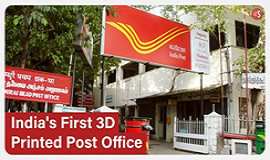
|
India's first 3D-printed post office is coming up in Bengaluru.
About:
- The project is being implemented by Larsen & Toubro, which has experience in constructing 3D-printed buildings.
- The construction cost of this post office is about 30 to 40 per cent lower than constructing a conventional building and is expected to be completed in 30 days.
- The 3D-printed post office will be about 1100 sq. ft. and the cost of construction is Rs.23 lakh.
Significance:
- This will enhance the technology inclusion and a public welfare policy.
|
|
Polity and Governance
2. Election Commission grants national party status to AAP
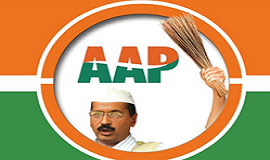
|
The Arvind Kejriwal-led Aam Aadmi Party has got the status of ‘National Party’ as announced by the Election Commission of India (ECI).
About:
- In the event, the removal of NCP, CPI, and TMC was also announced.
- There are now only six national parties in the country – BJP, Congress, National People’s Party, CPM, Bahujan Samaj Party and the latest addition AAP.
What is a National Party?
- A party that secures at least six per cent of the total votes in Lok Sabha elections or Assembly elections in four States and wins at least four seats in the Lok Sabha is recognised as a national party.
A Recognised party:
- A recognised political party enjoys privileges like;
- a reserved party symbol, free broadcast time on state-run television and radio, consultation in the setting of election dates, and giving input in setting electoral rules and regulations.
Criteria for National party status:
- According to Election Commission rules, a party gets national status if it is recognized as a state party in four states. For recognition as a state party, it has to secure at least six percent of the valid votes polled and two seats each in Assembly or Lok Sabha polls.
- The AAP got the status of a national party as it secured nearly 13 percent of the vote share and five seats in the Gujarat Assembly polls earlier this year making it the state party in four states—Delhi, Goa, Punjab and Gujarat
|
|
Polity and Governance
3. Schools for children with special needs by 2025
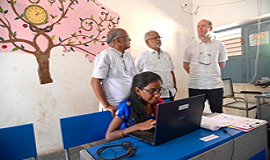
|
Andhra Pradesh government’s Samagra Siksha, Kerala-based NGO Chakshumathi and Anantapur-based Rural Development Trust (RDT) have come together to make all the 46,000 government schools in the State inclusive pedagogy-ready by March 2025.
About the plan:
- As part of the masterplan, Chakshumathi and RDT have so far trained 400 government teachers in digital inclusive pedagogy.
- This programme will be launched across in the State of Andhra pradesh.
- The spadework for the programme was done by RDT-run Inclusive High School in Anantapur, where digital inclusive pedagogy has been doing wonders for the first batch of six visually impaired girls who are attending their Secondary School Certificate (SSC) examinations without any scribe.
- The State government made all arrangements at Rapthadu Zilla Parishad High School (examination centre) in the district to enable these Children with Special Needs (CwSN) to get a digitally converted question paper that supports screen-reading software.
|
|
Polity and Governance
4. Rajasthan’s first Vande Bharat Express flagged off
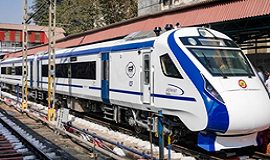
|
Rajasthan's first Vande Bharat Express train has made its inaugural journey between Jaipur and Delhi Cantt railway stations.
About:
- Objective:
- Aimed at improving connectivity between the tourist spots in Rajasthan, the Vande Bharat Express is going to operate between Ajmer and Delhi Cantt, with stops at Jaipur, Alwar and Gurgaon.
- It will connect Delhi to Pushkar and Ajmer Sharif Dargah, among other major tourist destinations.
- The train will complete the Ajmer-Delhi Cantt journey in five hours and 15 minutes, an hour lesser than the time taken by the fastest train on the route currently.
- The Shatabdi Express plying between Delhi Cantt and Ajmer takes 6 hours and 15 minutes.
|
|
Economy
5. India set to grow by 5.9% this fiscal: IMF
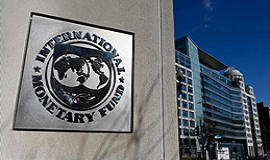
|
The International Monetary Fund (IMF) has projected that India’s economy will grow by 5.9% for the current fiscal year April 2023 - March 2024.
About the forecast:
- The IMF estimated a 6.3% economic growth rate for India for the next fiscal year, a downward revision of 0.5 percentage points from the last forecast.
- The IMF maintained an optimistic outlook on India, explaining the down revision as an adjustment for historical numbers that were better than expected.
- Global output growth is projected by the IMF to slow to 2.8% in 2023 (calendar year), picking up to 3% in 2024.
Reasons for slow recovery:
- The global economy’s gradual recovery from both the pandemic and Russia’s invasion of Ukraine remains on track”.
- Adding with the China’s reopened economy was strongly rebounding and supply chain disruptions were unwinding, and negative impacts of the war on food and energy prices were receding.
|
|
Economy
6. Quality Control Orders for technical textile products

|
The Ministry of Textiles has introduced two Quality Control Orders (QCOs) for 31 technical textile items, including 19 geo textile and 12 protective textile products.
About:
- These are the first technical regulation in the country for technical textile products.
- The 19 geo textile items include;
- Laminated High Density Polyethylene (HDPE) woven geo membrane for waterproof lining,
- PVC geo membranes and needle punched non-woven geo-bags.
- The protective textile products include;
- Curtains and drapes,
- Upholstered composites used for non-domestic furniture,
- Bullet resistant jackets, and
- Protective clothing for fire-fighters.
- Mandatory BIS marking for these products will come into effect 180 days immediately after the date of the publication of the orders in the gazette and both, domestic manufacturers and those abroad who export to India, will have to meet the standards.
Bureau of Indian Standards (BIS):
It is the National Standard Body of India.
- Bureau of Indian Standards has been operating Management Systems Certification Scheme since 1991.
- Initially, BIS started the scheme with Quality Management System Certification (IS/ISO 9001) and over the years it has gradually expanded its activities to various other Management Systems.
|
|
Science and Technology
7. 6 GHz spectrum

|
The telcos and broadband providers are attracting towards the new 6GHz Spectrum against fixed line Internet Service Providers (ISPs), as they are keen to lay claim on a band of spectrum that could enable the next generation of 5G, or WiFi.
|
Note: 1 Megahertz (MHz) is equal to one million hertz 106 Hz)
|
About:
- The Spectrum ranges from 5,925 to 7,125 megahertz (MHz).
- Newer WiFi routers in India largely use spectrum on two bands, sometimes simultaneously: 2.4GHz and 5GHz.
- As frequency increases, the range of the signal drops, but the bandwidth goes up significantly.
- The WiFi 6E standard, launched in 2020, uses 6 GHz, enabling speeds upwards of 9.6 gigabits per second (Gbps).
- No home internet provider currently offers those speeds in India, but 6GHz spectrum supports multiple devices on a wireless network more harmoniously than in the 5GHz band, even on slower connections, enticing telecom providers and ISPs.
- Meta Platforms (which owns Facebook and WhatsApp), Microsoft Corporation, and Google in 2020 urged the Telecom Regulatory Authority of India (TRAI) that it is critical that regulators enable all parts of the broadband ecosystem to advance in capabilities, and even more critical in the case of license-exempt technologies given their important role in supporting broadband requirements.
|
|
Science and Technology
8. Joint Military Exercise ‘Ex KAVACH’
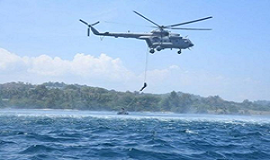
|
Andaman and Nicobar Command (ANC) conducted a large-scale Joint Military Exercise ‘Ex KAVACH’ involving the assets of the Army, Navy, Air Force and Coast Guard.
About:
- The exercise was began on February 23, 2023, concluded on April 07, 2023.
- The exercise was aimed at fine-tuning joint warfare capabilities & Standard Operating Procedures (SOPs) and enhancing interoperability and operational synergy between the forces.
- Elements of the ‘Shatrujeet Brigade’ of the Army, Armed Forces Special Operations Division (AFSOD), Special Forces of the Navy and Amphibious troops of the ANC, participated in the multi-domain exercise involving amphibious landing, air-landed operations, heliborne operations and rapid insertion of the Special Forces from mainland on a remote Island of the Andaman and Nicobar Islands.
Key features of the event:
- Exercise KAVACH’ demonstrated the capabilities and preparedness of the Armed Forces to safeguard India's maritime interests and ensure the security of the Andaman and Nicobar Islands.
- The exercise effectively showcased the professionalism and synergy amongst the different components of ANC while conducting successful joint operations in a complex and dynamic environment
|












